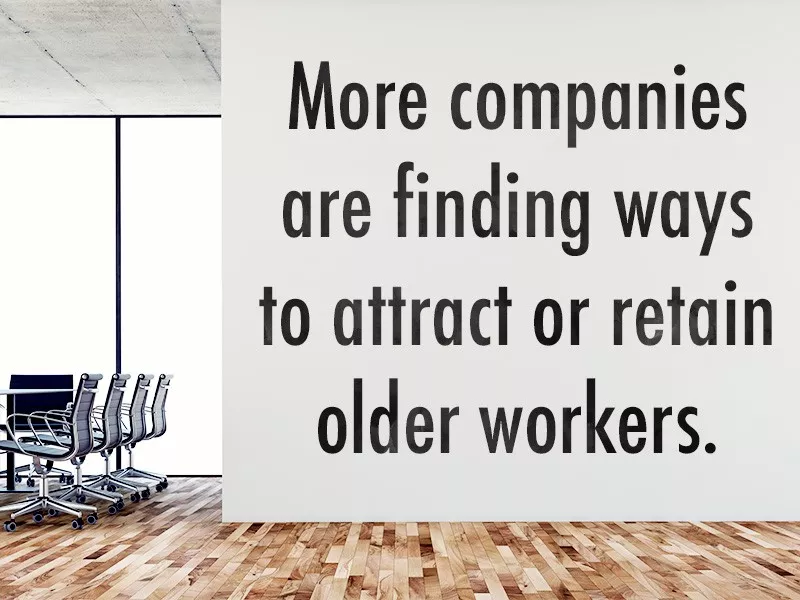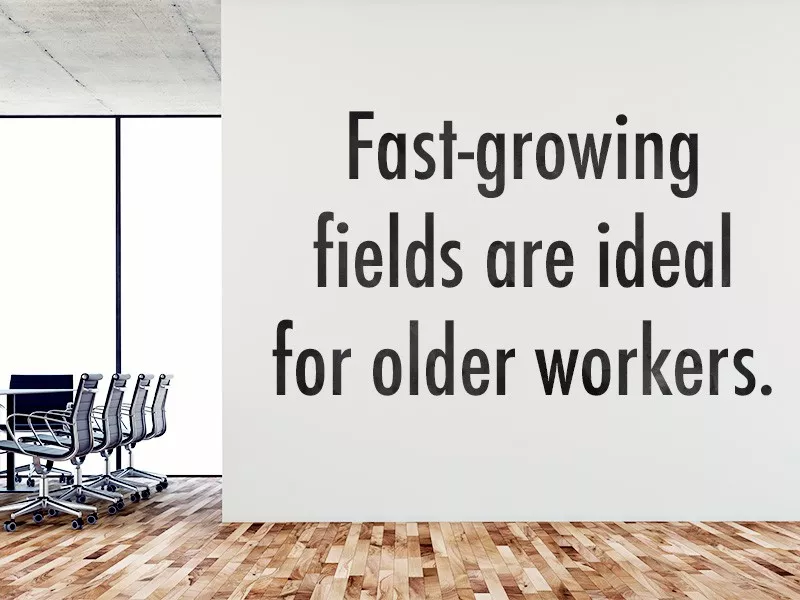Workers over 55 are a big part of the American workforce, roughly 20 percent, and that number is growing as the general population ages. Studies show that older workers have lower absentee rates and job turnover than younger workers, not to mention years of experience and skills gained from a long working life.
All of this can actually make older workers more productive. With a growing skills shortage and tightening job market hitting the American economy, companies should ideally be encouraging older workers to pass on their knowledge and keeping them employed for as long as they can before they retire. However, age discrimination in the workplace and in hiring practices remains a serious issue.
So, what can people over 55 do to keep themselves motivated, be effective in the workplace and continue having a positive outlook about work and life in general? We’ve come up with a list of 30 pieces of career advice, including how to face the big question of whether or not to attempt a job or career change.
Still Plan Out Your Goals

jeffbergen / Getty Images
If you’re over 55, you’ve likely been working for many years. You may be well-established in your career or are even at a supervisory or managerial level. This might be a good time to take stock of your professional life.
Have you achieved your career goals? Have you been able to balance work and personal life? Are you thinking of changing jobs or careers?
The factors that make work enjoyable and fulfilling for younger people still apply for older workers: the ability to learn, being challenged, flexibility, meaningful work, social connections, career progression, positive work-life balance and inclusion.
Stay Motivated (Because Retirement Might Still Be a Ways Off)

ljubaphoto / Getty Images
A number of factors can cause older workers to lose motivation. Wage growth for workers over 55 is only 2.4 percent, compared to the national average of 3 percent, and hourly pay actually begins to decline for workers over 60.
In other words, age discrimination remains a problem in the U.S.
While these figures can be discouraging, it’s also important to focus on keeping a balanced perspective. The reality is that many people over 55 still have 15, 20 or more years of productive working life before retirement.
Some workers are holding jobs into their 80s or 90s.
Raise Awareness About Supporting Aging Staff With Health Issues

Getty Images
With 10,000 Baby Boomers (people born 1946 to 1964) retiring each year, and a growing skills shortage in the U.S., more companies are finding ways to attract or retain older workers with valuable experience and knowledge.
Some companies, such as St. Luke’s Health System in Idaho, are creating part-time jobs for older workers or transferring them to less demanding roles, such as administration or teaching. “[Companies] need to adopt this blended workforce model, or they’re going to be in trouble,” said Timothy Tolan, CEO of The Tolan Group, a healthcare recruiter.
Sometimes, age discrimination happens due to a complete lack of awareness, so make sure that your manager or employer is aware of the importance of supporting staff with health issues as people age.
Use LinkedIn Regularly

Getty Images
Once you’ve set up a killer profile on LinkedIn, then you should use it regularly. Stay active on the site by participating in forums and discussion groups, sharing advice, adding connections to your network and posting (or re-posting) useful content.
The more active you are, the faster your network will grow. After all, LinkedIn has 176 million members in the U.S. alone.
You can use the site for generating leads, finding clients or job hunting.
B2B marketers get 80 percent of their social media leads from the site, and 87 percent of recruiters use the site regularly to post jobs.
Consider an Industry That Has Strong Job Growth

Wavebreakmedia / Getty Images
If you’re over 55 and you decide that you want to completely change careers, there are a number of industries that are having strong job growth.
Working as an expert consultant, either staying in your current industry or switching fields, is one option.
Health and aged care is a rapidly growing industry, and there is increasing demand for carers, medical assistants and administrative workers.
Other job choices include working as a teacher or tutor, being a content writer, or working in IT as a support specialist, software developer or networking administrator.
Find Companies That Are Age-Friendly

Stígur Már Karlsson /Heimsmyndir / Getty Images
If you feel your company is ageist or lacks the flexibility to adapt to the needs of older workers, consider looking for a company that is age-friendly.
The start-up, education, non-profit, government and financial services sectors are often the best workplaces for recognizing ageless skills and talent.
AARP, the over-50 advocacy group, compiles an annual list of the best employers for older workers. The group also offers guides and resources to employers who actively seek to recruit people over 50.
Recruitment sites, such as Monster.com or Indeed.com, write blog posts on or compile lists of age-friendly companies.
Know What Careers Are Best for Older Workers

Getty Images
Let’s turn to AARP again, which compiled a list of fields that are growing rapidly and need more workers in coming years.
Fast-growing fields are ideal for older workers, as companies are often more flexible about transferring previous job skills or training older workers.
These careers include sales managers, sales representatives in wholesale and manufacturing industries, computers and information technology, marketing, advertising, promotions, public relations, vehicle operations, health technicians and paramedics, financial specialists, engineers, and business operations specialists and managers.
Consider Setting Up Your Own Small Business

monkeybusinessimages / Getty Images
By this stage in your life, you’ve gained considerable experience, talents and wisdom and may want more control over your working hours or environment.
Your kids may be grown and a mortgage close to or fully paid, so you’re less likely to have large financial obligations.
But if you’re 55, you may still have 15, 20 or 30 years of working life left, so a switch to freelance or consulting work might provide the flexibility you’re looking for.
This is especially true if you have a hobby or side income that you’d like to turn into a part- or full-time business.